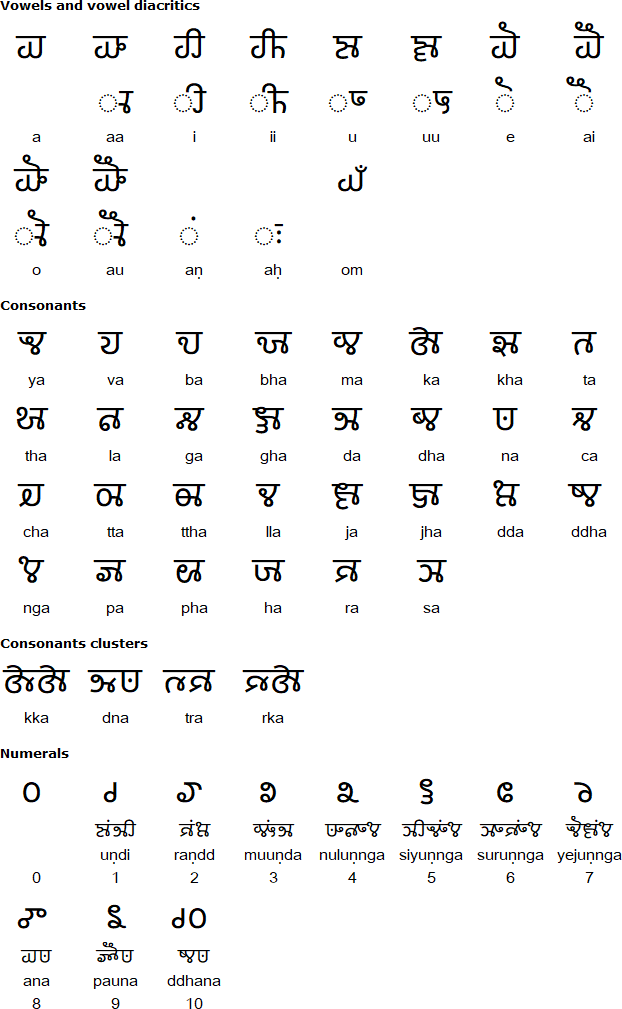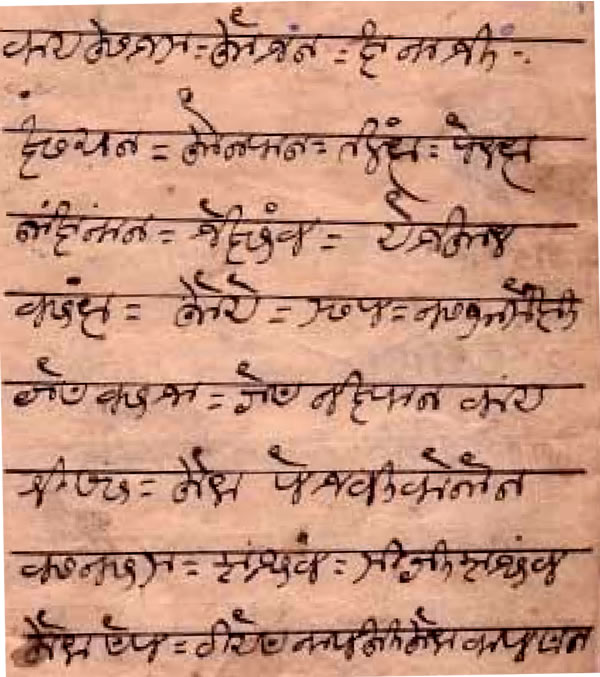Gunjala Gondi is a an abugida or consonant alphabet used to write Gondi, a Central Dravidian language spoken mainly in the Indian states of Telangana, Maharashtra and Madhya Pradesh.
In 2006 a team of researchers from the University of Hyderabad led by Professor Jayadheer Tirumala Rao found a number of manuscripts dating from about 1750 in Gunjala, a village in Adilabad district of Telangana state in central India. The manuscripts were written in an unknown script which they named Gunjala Gondi. Later they found that a few elderly people could read the script and that it was used to write Gondi. They revealed their discoveries in 2014, a font was made, and the script was added to Unicode in 2018.
About 80 people have learnt to read and write the script, and they are writing stories in it. A number of books have been published in Gunjala Gondi, and it is being taught in some schools in Andhra Pradesh.
Gunjala Gondi is also known as Gunjala Gondi Lipi or Koytura Gunjala Lipi.

Download an alphabet chart for Gunjala Gondi (Excel)

Details provided by Biswajit Mandal (biswajitmandal[dot]bm90[at]gmail[dot]com)
Information about Gunjala Gondi
https://en.wikipedia.org/wiki/Gunjala_Gondi_script
https://www.thehindu.com/news/cities/Hyderabad/almanac-in-a-near-extinct-adivasi-script/article26178311.ece#!
https://www.thehindu.com/news/cities/Hyderabad/gondi-script-and-font-unveiled/article5714329.ece
https://www.endangeredalphabets.net/alphabets/gondi/
https://www.unicode.org/L2/L2015/15235r-gunjala-gondi.pdf
Ahom, Aima, Arleng, Badagu, Badlit, Basahan, Balinese, Balti-A, Balti-B, Batak, Baybayin, Bengali, Bhaiksuki, Bhujimol, Bilang-bilang, Bima, Blackfoot, Brahmi, Buhid, Burmese, Carrier, Chakma, Cham, Cree, Dehong Dai, Devanagari, Dham Lipi, Dhankari / Sirmauri, Ditema, Dives Akuru, Dogra, Ethiopic, Evēla Akuru, Fox, Fraser, Gond, Goykanadi, Grantha, Gujarati, Gunjala Gondi, Gupta, Gurmukhi, Halbi Lipi, Hanifi, Hanuno'o, Hočąk, Ibalnan, Incung, Inuktitut, Jaunsari Takri, Javanese, Kaithi, Kadamba, Kamarupi, Kannada, Kawi, Kharosthi, Khema, Khe Prih, Khmer, Khojki, Khudabadi, Kirat Rai, Kōchi, Kodava Lipi, Komering, Kulitan, Kurukh Banna, Lampung, Lanna, Lao, Lepcha, Limbu, Lontara/Makasar, Lota Ende, Magar Akkha, Mahajani, Malayalam, Meitei (Modern), Manpuri (Old), Marchen, Meetei Yelhou Mayek, Meroïtic, Masarm Gondi, Modi, Mon, Mongolian Horizontal Square Script, Multani, Nandinagari, Newa, New Tai Lue, Ojibwe, Odia, Ogan, Pahawh Hmong, Pallava, Phags-pa, Purva Licchavi, Qiang / Rma, Ranjana, Rejang (Kaganga), Sasak, Savara, Satera Jontal, Shan, Sharda, Sheek Bakrii Saphaloo, Siddham, Sinhala, Sorang Sompeng, Sourashtra, Soyombo, Sukhothai, Sundanese, Syloti Nagri, Tagbanwa, Tai Noi, Takri, Tamil, Tanchangya (Ka-Pat), Tani, Thaana, Telugu, Thai, Tibetan, Tigalari, Tikamuli, Tocharian, Tolong Siki, Vatteluttu, Warang Citi
Page last modified: 16.03.23
[top]
You can support this site by Buying Me A Coffee, and if you like what you see on this page, you can use the buttons below to share it with people you know.

If you like this site and find it useful, you can support it by making a donation via PayPal or Patreon, or by contributing in other ways. Omniglot is how I make my living.
Note: all links on this site to Amazon.com, Amazon.co.uk
and Amazon.fr
are affiliate links. This means I earn a commission if you click on any of them and buy something. So by clicking on these links you can help to support this site.
[top]